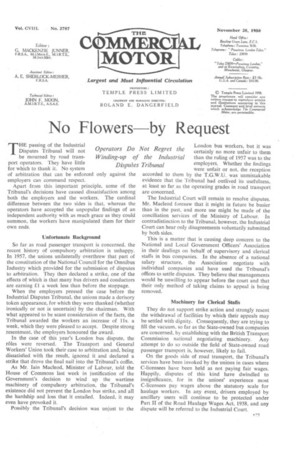No Flowers by Request
Page 31

If you've noticed an error in this article please click here to report it so we can fix it.
Operators Do Not Regret the Winding-up of the Industrial Dispules Tribunal
THE passing of the Industrial Disputes Tribunal will not be mourned by road transport operators. They have little for which to thank it. No system of arbitration that can be enforced employers can command respect. only against the Apart from this important principle, Tribunal's decisions have caused dissatisfaction among both the employers and the workers. The cardinal difference between the two sides is that, whereas the operators have accepted the unpopular findings of an independent authority with as much grace as they could summon, the workers have manipulated them for their own ends. some of the Unfortunate Background So far as road passenger transport is concerned, the recent history of compulsory arbitration is unhappy. In 1957, the unions unilaterally overthrew that part of the constitution of the National Council for the Omnibus Industry which provided for the submission of disputes to arbitration. They then declared a strike, one of the effects of which is that many bus drivers and conductors are earning £.1 a week less than before the stoppage.
When the employers pressed the case before the Industrial Disputes Tribunal, the unions made a derisory token appearance, for which they were thanked (whether ironically or not is uncertain) by the chairman. With what appeared to be scant consideration of the facts, the Tribunal awarded the workers an increase of 1 ls. a week, which they were pleased to accept. Despite strong resentment, the employers honoured the award.
In the case of this year's London bus dispute, the roles were reversed. The Transport and General Workers' Union took their case to arbitration and, being dissatisfied with the result, ignored it and declared a strike that drove the final nail into the Tribunal's coffin.
As Mr. lain Macleod, Minister of Labour, told the House of Commons last week in justification of the Government's decision to wind up the wartime machinery of compulsory arbitration, the Tribunal's existence did not prevent the London bus strike, and all the hardship and loss that it entailed. Indeed, it may even have provoked it.
Possibly the Tribunal's decision was unjust to the London bus workers, but it was certainly no more unfair to them than the ruling of 1957 was to the employers. Whether the findings were unfair or not, the reception accorded to them by the T.G.W.U. was unmistakable evidence that the Tribunal had outlived its usefulness, at least so far, as the operating grades in road transport are concerned.
The Industrial Court will remain to resolve disputes. Mr. Macleod foresaw that it might in future be busier than in the past, and more use might be made of the conciliation services of the Ministry of Labour. In contradistinction to the Tribunal, however, the Industrial Court can hear only disagreements voluntarily submitted by both sides.
This is a matter that is causing deep concern to the National and Local Government Officers' Association in their dealings on behalf of supervisory and clerical staffs in bus companies. In the absence of a national salary structure, the Association negotiate with individual companies and have used the Tribunal's offices to settle disputes. They believe that managements would be unwilling to appear before the court and that their only method of taking claims to appeal is being removed.
Machinery for Clerical Staffs They do not support strike action and strongly resent the withdrawal of facilities by which their appeals may be settled with dignity. Consequently, they are trying to fill the vacuum, so far as the State-owned bus companies are concerned, by establishing with the British Transport Commission national negotiating machinery. Any attempt to do so outside the field of State-owned road passenger transport is, however, likely to fail.
On the goods side of road transport, the Tribunal's services have been invoked by the unions in cases where C-licensees have been held as not paying fair wages. Happily, disputes of this kind have dwindled to insignificance, for in the unions' experience most C-licensees pay wages above the statutory scale for haulage workers. In any event, drivers employed by ancillary users will continue to be protected under Part II of the Road Haulage Wages Act, 1938, and any dispute will be referred to the Industrial Court.












































































































